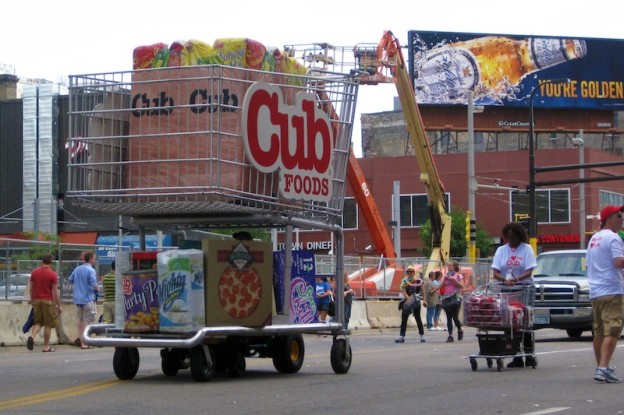

Sales is golden
Last month, we looked at the decline of Supervalu, the locally-based grocery distribution and retail giant. We saw a record of lax oversight by the board of directors, poor strategic decisions by management, outrageous executive compensation, and lots of cutbacks for the company’s employees.
The other shoe finally dropped for the company last week, as Cerberus Capital Management purchased four of the company’s retail banners (Albertsons, Jewel, Acme, and Shaw’s) for $100 million in cash and assumption of $3.2 billion of debt and offered to buy a 30% stake in the remaining pieces of the company. Essentially, this transaction undoes the 2006 acquisition of Albertsons and leaves Supervalu with its original portfolio of local grocery chains (Cub in the Twin Cities, Hornbachers in Fargo, Shop and Save in St. Louis, Shoppers in Baltimore and Washington D.C., and Farm Fresh in Virginia), wholesale distribution and the Aldi-like extreme discount chain Save A Lot.
The seven-year history of the acquisition was truly disastrous for Supervalu. In 2006, they paid $9.7 billion in cash and stock, three times what they unloaded it for. So what’s the full cost of setting the wayback machine back to before the deal?
Over the last seven years, the revenue for the surviving portion of the company fell by about $2 billion over that time. Of the $6.7 billion in debt Supervalu had related to the Albertsons acquisition, fully $3 billion of it will remain with the company even after selling off all of the banners, if the company hits its goal of paying off an additional $500 million in debt before the end of the fiscal year in late February.
These changes, on the whole, probably strengthen the remaining company somewhat. Cerberus acquired the four banners that were facing the most significant challenges competitively (but they also had the highest upside on the positive end), and Supervalu’s wholesale distribution business has been a steady profit-producing machine that can now be used to finance improvements across a smaller group of stores. This should accelerate Supervalu’s turnaround strategy for these stores.
The transaction also accelerates some other things, though. In the last post, we discussed the significant payday that Supervalu CEO Wayne Sales was poised to receive in his first year on the job. As part of the transaction, Sales’s seven-month term at the company comes to a close (he’s relaced by former OfficeMax and ShopKo CEO Sam Duncan), and his golden parachute is activated.
And it turns out to have been a very good seven months for Mr. Sales.
Under the terms of Sales’s two-year contract, here’s all the compensation he collects for his time as Supervalu CEO:
| Description | Amount |
| Signing bonus | $1.2 million |
| Base salary, year 1 | $1.5 million |
| Base salary, year 2 | $1.5 million |
| Stock grants at time of hire | $1.8 million |
| Performance based stock grants | $1.8 million |
| Bonus, Fiscal Year 2013 | $1 million |
| Bonus, Fiscal Year 2014 | $1.5 million |
| Bonus, Fiscal Year 2015 | $0.5 million |
| Cash payment in lieu of performance stock | $2.2 million |
| TOTAL | $13 million |
| Stock valued at $4 per share, based on the Cerberus tender offer. | |
Yes, you’re reading that right. Sales gets his base salary for the entire length of the contract, plus he gets performance bonuses for future years, plus a health cash check in lieu of stock he would have had to earned an additional bonus. In total, a $13 million paycheck for seven months of work.
New CEO Sam Duncan is set to cash in similarly. Upon taking the reins of the company, Duncan will receive a signing bonus of $500,000 and earn an annual base salary of $1.5 million. Duncan will also receive 1.5 million shares of SUPERVALU stock over the next three years, worth in excess of $4.5 million at current trading prices. Additionally, Duncan is eligible for annual cash bonuses with a target of $1.5 million (and a maximum of $3 million) per year.
Recall that Sales’s predecessor, Craig Herkert – whose performance led to his dismissal as CEO in July – only received a base salary of $850,000 in the three years he completed as the company’s leader. With the company in worse shape, the CEOs are being rewarded with higher rates of non-performance based pay. Something is wrong with that picture.
Within months, the pink slips will be flying at Supervalu’s offices in Eden Prairie. As displaced workers head out the doors and those that remain plod on with hiked health care insurance rates and a missing 401(k) match, remember that the decline of Supervalu’s business has been a lucrative process for those at the top.
Thanks for your feedback. If we like what you have to say, it may appear in a future post of reader reactions.

